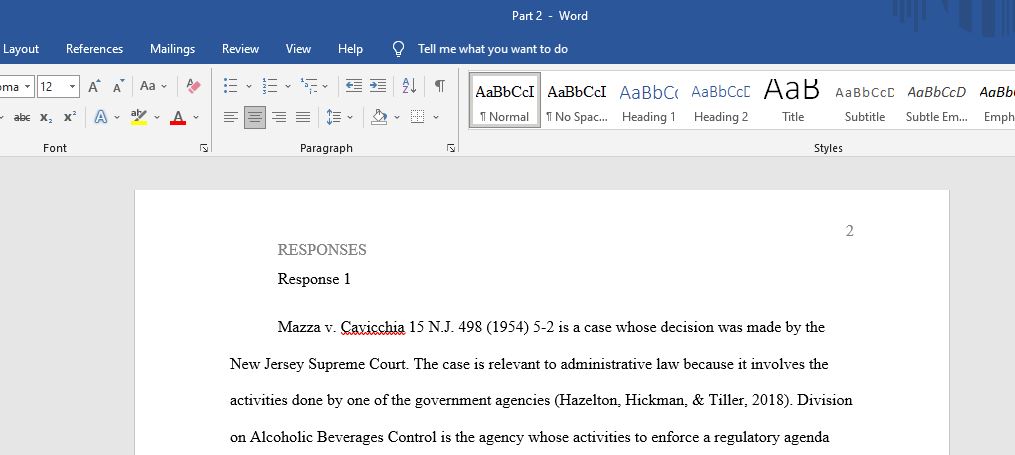Review and read a case on United States v. Florida East Coast Railway
ere is one post:
- Style of the Case:
- Mazza v. Cavicchia 15 N.J. 498 (1954) 5-2
- Page Number: 218 – 220
- The New Jersey Supreme Court rendered the decision.
- Facts of the Case: In the case of Mazza v. Cavicchia (1954), the petitioner managed the Traveler’s Hotel & Restaurant where he was permitted to sale alcoholic beverages with an appropriate liquor license. However, the license was nullified after the petitioner allowed lewd activities and contraceptives to be sold in the premises. As such, the lower court upheld that Mazza was in violation of state rules which authorizes the sale of liquor within the operation of the business. Consequently, the litigant file suit after being notified that the decision to revoke the business’s liquor license, for approximately 180 days, emerged after the Division on Alcoholic Beverages Control held a hearing regarding the operation of the business. It is important to note that Mazza was not provided the report used in the proceeding.
- The Legal Issue:Did the Division of Alcoholic Beverage Control violate the petitioner’s constitutional rights under N.J. Const. 1947, Article VI, Section. V, par. 1, clause (a) by denying Mazza Due Process and a reasonable hearing before the Division?
- The Holding:The decision in this case was provided by Justice Vanderbilt who held that failing to disclose an administrative law judge’s (ALJs) report is in fact in violation of the petitioners Due Process.
- The Court’s Rational: Justice Vanderbilt rational emphasized the used of hearer’s report which has been utilized and insisted upon for twenty-one years. The Court further stated the Director should have taken into account the hearer’s report when making a decision provided that it has functioned to successfully serve as key to the facts and the statutory law of each individual case. Thus, the decision-making must demonstrate basic standards of the exclusiveness of the record.
- Dissenting Opinion’s Rational:Justice Jacobs delivered the dissenting opinion in which it states that as judicial reviewers, the proceeding should be examined with full acknowledgement that the Division of Alcoholic Beverage Control is in fact a fragment of a coordinated branch of government administration. Thus, the administrator must be provided the discretionary capacity to effectively render statutory administrative judgement in his legal domain as judges have and continue to do so in theirs. Therefore, the record indicates that the litigant in this case was reasonably charged, tried, and found guilty of the violation based on compelling evidence. Moreover, the appellant’s liquor license was fairly revoked with compliance with all legal and constitutional requirements.
Reference:
Harrington, C.B., & Carter, L. H. (2015). Administrative law & politics: Cases and comments. CQ Press.
Here is the second post:
Question 1. Style of the case
Gibson v. Berryhill (1973), textbook page 220, jurisdiction U.S. Supreme Court.
Question 2. Facts of the case
The Alabama Optometric Association, made up of optometrists in private practice, filed charges with the Alabama Board of Optometry, also composed solely of optometrists in private practice, asking that the licenses of optometrists employed by Lee Optical be revoked for unprofessional conduct. After a delay in which the board successfully sought court enforcement to stop the company from operating, the board prepared to hear the charges. Appellees filed suit under the Civil Rights Act of 1871 seeking an injunction against scheduled hearings regarding revoking appellees’ licenses, alleging that the Board was biased and could not provide appellees with a fair and impartial hearing
Question 3. The Legal Issue
The Supreme Court held that the question of whether licensed optometrists could be employed by business corporations could not be decided by an optometry board composed of licensed optometrists who were independent contractors.
Question 4. The Holding
The U.S. Supreme Court rendered the decision unanimously (9-0): “It is sufficiently clear from our cases that those with a substantial pecuniary interest in legal proceedings should not adjudicate these disputes…
The District Court proceeded on this basis and, applying the standards taken from our cases, concluded that the pecuniary interest of the members of the Board of optometry had sufficient substance to disqualify them, given the context in which this case arose. As remote, as we are from the local realities underlying this case and it is very likely that the District Court has a firmer grasp of the facts and of their significance to the issues presented, we have no good reason on this record to overturn its conclusion and we affirm it…”
Question 5. The Court’s Rational
The District Court thought the Board to be impermissibly biased for two reasons. First, the Board had filed a complaint in state court alleging… charges… substantially similar to those pending against appellees before the Board…
Secondly, the District Court determined that the aim of the Board was to revoke the licenses of all optometrists in the state who were employed by business corporations such as Lee and that these optometrists accounted for nearly half of all the optometrists practicing in Alabama.
What is needed is for you to reply to each post that i sent you. This is only a discussion board post so the responses does not have to be detailed. Thank you

word limit: 396
